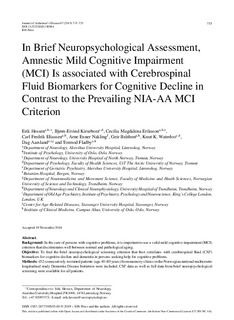| dc.contributor.author | Hessen, Erik | |
| dc.contributor.author | Kirsebom, Bjørn-Eivind | |
| dc.contributor.author | Eriksson, Cecilia Magdalena | |
| dc.contributor.author | Eliassen, Carl Fredrik Andestad | |
| dc.contributor.author | Nakling, Arne | |
| dc.contributor.author | Bråthen, Geir | |
| dc.contributor.author | Waterloo, Knut | |
| dc.contributor.author | Aarsland, Dag | |
| dc.contributor.author | Fladby, Tormod | |
| dc.date.accessioned | 2019-12-10T07:44:25Z | |
| dc.date.available | 2019-12-10T07:44:25Z | |
| dc.date.created | 2019-04-03T10:59:24Z | |
| dc.date.issued | 2019 | |
| dc.identifier.citation | Journal of Alzheimer's Disease. 2019, 67 (2), 715-723. | nb_NO |
| dc.identifier.issn | 1387-2877 | |
| dc.identifier.uri | http://hdl.handle.net/11250/2632370 | |
| dc.description.abstract | Background:
In the care of persons with cognitive problems, it is important to use a valid mild cognitive impairment (MCI) criterion that discriminates well between normal and pathological aging.
Objective:
To find the brief neuropsychological screening criterion that best correlates with cerebrospinal fluid (CSF) biomarkers for cognitive decline and dementia in persons seeking help for cognitive problems.
Methods:
452 consecutively recruited patients (age 40–80 years) from memory-clinics in the Norwegian national multicentre longitudinal study Dementia Disease Initiation were included. CSF data as well as full data from brief neuropsychological screening were available for all patients.
Results:
Amnestic MCI, including at least one memory test below T-score 40, outperformed the conventional US National Institute on Aging-Alzheimer’s Association (NIA-AA) MCI criterion. Only amnestic MCI was significantly associated with biomarker pattern of NIA-AA stage 2 (low CSF Aβ42 concentrations and elevated tau) in multivariate regression analysis.
Conclusions:
The finding that amnestic MCI based on brief neuropsychological assessment is significantly associated with CSF biomarkers for cognitive decline and Alzheimer’s disease is in accordance with longitudinal studies that find memory impairment; both in itself and especially in combination with other cognitive deficit to constitute a risk factor for subsequent cognitive decline and dementia. The prevalence of pathological biomarkers for Alzheimer’s disease is common in the elderly and the clinical significance of present findings depend on longitudinal validation. | nb_NO |
| dc.language.iso | eng | nb_NO |
| dc.publisher | IOS Press | nb_NO |
| dc.rights | Navngivelse 4.0 Internasjonal | * |
| dc.rights.uri | http://creativecommons.org/licenses/by/4.0/deed.no | * |
| dc.title | In Brief Neuropsychological Assessment, Amnestic Mild Cognitive Impairment (MCI) Is associated with Cerebrospinal Fluid Biomarkers for Cognitive Decline in Contrast to the Prevailing NIA-AA MCI Criterion | nb_NO |
| dc.type | Journal article | nb_NO |
| dc.type | Peer reviewed | nb_NO |
| dc.description.version | publishedVersion | nb_NO |
| dc.source.pagenumber | 715-723 | nb_NO |
| dc.source.volume | 67 | nb_NO |
| dc.source.journal | Journal of Alzheimer's Disease | nb_NO |
| dc.source.issue | 2 | nb_NO |
| dc.identifier.doi | 10.3233/JAD-180964 | |
| dc.identifier.cristin | 1689919 | |
| dc.description.localcode | © 2019 – IOS Press and the authors. All rights reserved. This article is published online with Open Access and distributed under the terms of the Creative Commons Attribution Non-Commercial License (CC BY-NC 4.0). | nb_NO |
| cristin.unitcode | 1920,5,0,0 | |
| cristin.unitcode | 194,65,30,0 | |
| cristin.unitcode | 1920,16,0,0 | |
| cristin.unitname | Klinikk for fysikalsk medisin og rehabilitering | |
| cristin.unitname | Institutt for nevromedisin og bevegelsesvitenskap | |
| cristin.unitname | Nevroklinikken | |
| cristin.ispublished | true | |
| cristin.fulltext | original | |
| cristin.qualitycode | 1 | |

